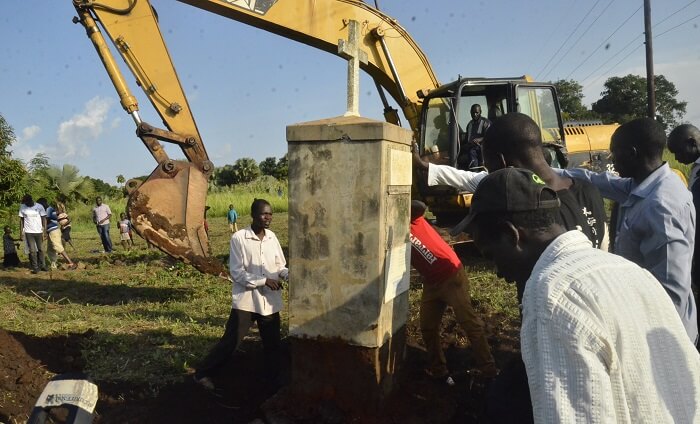GULU, UGANDA: The Lukodi Massacre Monument built in memory of the people killed by the Lord Resistance Army rebels in Lukodi village Bungatira subcounty Gulu district was on Monday shifted to its permanent site after the owner of the land repossessed it.
The monument was built about 17 kilometres north of Gulu City Business Centre along Gulu-Patiko road.
Following the request of victims of the atrocity to Foundation for Justice and Development Initiative-FJDI, the monument was on Monday shifted northward by approximately 800 meters away along the same Gulu-Patiko road.
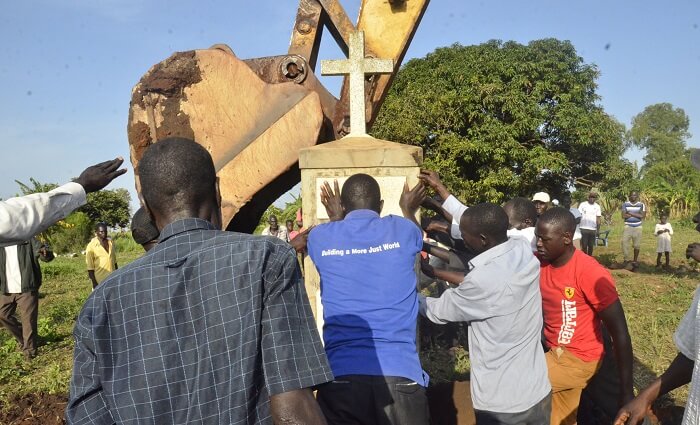
Benard Loum, head of Office, FJDI said the decision to relocate the monument was to leave the land it was standing on for development.
“We relocated this monument because the owner of the land where it was standing said he want to develop his land” said Loum, adding that “And the victim of Victim from Lukodi reached out to Foundation for Justice and Development Initiative and requested that we secure a piece of land for them and have this monument and today we shifted it.”
According to Loum, the monument is important in healing, reconciliation and memory to ensure that the gross human rights violation that happened in the past does not repeat.
He said FJDI is partnering with the association of victims of the Lukodi massacre to implement a holistic development plan on the two acres of land to have a museum, conference facility, visitors home and learning facility.
About the Monument
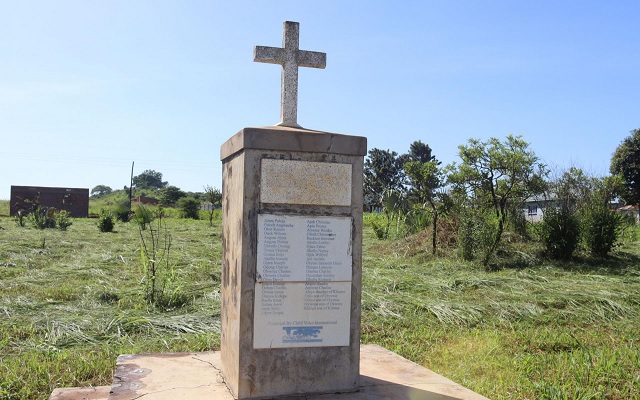
The Lukodi Massacre Monument was initiated in 2005 and built-in memory of the 62 people killed on the 19th of May 2004 by the LRA rebels under the command of the International Criminal Court convict, Dominic Ongwen.
Dominic Ogwen was sentenced on 6th May 2021 to 25 years of imprisonment following the Trial Judgement in which he was found guilty for a total of 61 crimes consisting of crimes against humanity and war crimes committed in Northern Uganda between July 2002 and 31st December 2005.
In honour of the people killed, The Child Voice International erected a monument bearing the names of people killed on the one-acre land offered by Thomas Okello.
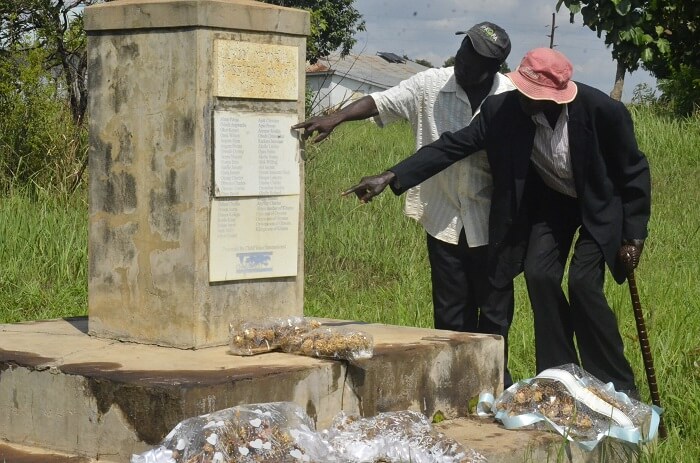
In a twist of event, in June 2022, Thomas Okello, the owner of the land where the monument was standing issued an instruction to the association of the victims of the Lukodi massacre to relocate the monument to give him a chance to develop his land.
Wilson Lalobo, the chairperson of the association says since the notification came out, they have been restlessly lobbying with development partners and individuals to help them acquire a piece of land to host the monument which they consider dearly in memory of their lost loved ones and luckily they were granted support by FJDI.
“With the support from FJDI, we bought this land measuring two acres from Oryem Peter. We bought it at seven million Uganda shillings (7,000,000/=),” said Lalobo, while expressing relief after being in tension to relocate it.
The monument will help to remember people murdered, the date of the atrocity and lessons to pass to younger generations about the danger of rebellion to discourage them from any future interest in joining it.
“We will use this monument to teach our children that rebellion is dangerous by showing them that during the LRA war, Acholi killed themselves and how the world wonders who could kill his own tribe” Lalobo explains.
He said they have been receiving tourists, and scholars from all parts of the world coming to learn about the LRA war, transitional justice and recovery, and when the land is built, they expect to receive many visitors, especially foreigners, which will bring revenue to the local government.
At the moment FJDI has set up a mini museum sitting in a classroom offered by Lukodi Primary School to gather artefacts of the war for documentation purposes. Still, now, the school also wants to repossess it after the management reportedly registered a hike in enrolment.
Loum encourages the community to collect and gather together artefacts for archive and documentation at the centre to build a robust and authentic information hub for tourists, researchers and students in this time when Northern Uganda deals with the legacy of the atrocities committed by the LRA.
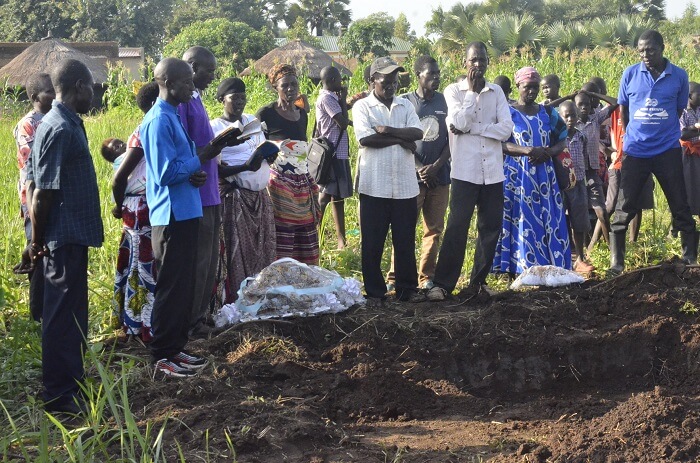
Santo Latigo, 67, a survivor of the cruel killing, recalled how he ran and hid in the bush at the time of the atrocity. He said the horror moment is still vivid in his sight and mind to date, especially when he sees the monument being shifted from the original site it was built.
According to Latigo, he participated in burying the people killed and after a day, the authority instructed them to exhume the bodies for documentation and they had to do it and then rebury.
Latigo believes that much as Dominic Ongwen has been sentenced for killing the Lukodi people, and the ICC is looking forward to starting reparation, absolute healing will come through traditional justice of reconciliation commonly referred to as Mato Oput.
Mato Oput is both a process and ritual ceremony that aims at restoring relationships between clans that would have been affected by either an intentional murder or accidental killing. It helps to bring together the two conflicting parties with the aim of promoting forgiveness and restoration, rather than revenge.
According to Loum, what is needed in Northern Uganda is to enhance and strengthen transitional justice (Mato Oput) because it brings healing and reconciliation among the family of perpetrators of the crime committed and the families and communities of the victims.
If you would like your article/opinion to be published on Uganda’s most authoritative news platform, send your submission on: [email protected]. You can also follow DailyExpress on WhatsApp and on Twitter (X) for realtime updates.


